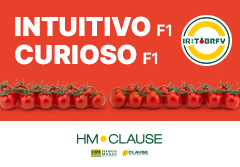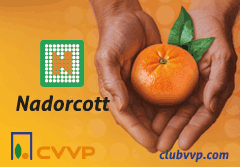Brussels’ constant, definitive withdrawal of agrochemicals used for persimmon crops is putting the focus on biological crops.
Some of the cooperatives belonging to the D.O. Kaki Ribera del Xúquer are already immersed in obtaining their own insectariums to tackle the rising problem of pests, as there are no longer any chemicals that can deal with them. Fruit Today talked to Cirilo Arnandis, chairman of the entity.
What is the roadmap for fighting against the pests that are attacking persimmons today?
Firstly, we must be aware that we won’t get the products that have been withdrawn back and that what we can do or not is laid down by Brussels. At the D.O. we are working with the IVIA and the Universidad Politécnica de Valencia in the search for new solutions. Owing to the lack of products, it is the time to rethink our biological control and sexual confusion strategies.
Accordingly, some cooperatives are committing to having their own insectariums for breeding predators against mealy bugs. The most serious point is that Europe has withdrawn a product while it doesn’t have a replacement to face up to this situation. This is really unacceptable.
What are the parameters at the start of the campaign for the D.O. Ribera del Xúquer?
It will obviously be an unusual campaign with a generalised trend of stabilisation of the crop, which could allow the prices for farmers to go up. The spring rains, which lasted almost two weeks, caused many humidity complications in the trees and mycosphaerella nawae. The floods encouraged the appearance of the pest, which also could not be dealt with as required due to the lockdown or to farmers having a lack of resources. All of this meant an important drop of fruit from mid-August to mid-September. The hail storm that took place at the beginning of October is added to this, which has meant more loss.
It is important to emphasise that in this campaign we have increased the geographical surface area attached to the D.O., with towns on the edges of La Ribera region, which will give us a strong boost in the years to come.
Can you tell me what volumes we are talking about?
The national production this year is around 300,000 million kilos, a figure that is a long way from the initial forecast, which was almost 400,000 million kilos. Regarding the D.O., last year 140 million kilos were produced, of which 110,000 million were marketed. The marketing forecasts that we are considering are around 6% lower than last season. The great advantage is that we think that it will be a campaign that will allow the farmers’ work to yield a profit. There will be an important reduction, but with enough capacity to take care of all the programmes.
We are seeing a constant lack of productivity for farmers and therefore, grubbing out of trees. What will the future of the persimmon be?
The production will stabilise over the next few years. We have gone from having a quality product that was produced with hardly any treatments, to having pests from other crops such as mealy bugs and flies. This involves very expensive treatments. In any event, it is still an unknown fruit for many consumers, even Spaniards. For this reason, the D.O. continues to endorse this product.
What is this year’s budget?
We have 1,800,000 euros for promotion which, as is normal, we will spread out across Germany, France, the UK, the Arab Emirates and, at specific times, in other countries. And of course, also in Spain, which is our main consumer. The associates, who contribute 0.012 cents per kilo produced, allow us to continue showing the world the quality of this product.
Do you think the persimmon boom would have been very different without these 30 million euros that have been spent from the very beginning?
Of course. Without promotion there is no consumption and a decade ago the product was unknown in the way we eat it today.
What lines of work and advertising has the D.O. marked out for this year? What could happen in the United Kingdom?
In spite of the fact that the production is lower than expected, we cannot put to one side the work to open up new markets, nor spotlighting actions on them because these are processes that take time. We won’t be starting up any new basic projects, but we also won’t drop the ones we have already started up in the Arab Emirates or Canada.
In the United Kingdom, a country that took its time in starting to eat persimmons, sales for this year are guaranteed. And I think that we will find a solution because it is not just us who want to sell there, as clients, they also want it.
























